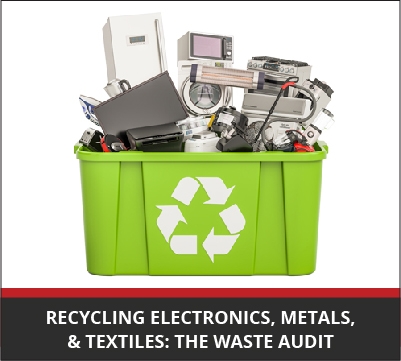We use cookies to make your experience better. To comply with the new e-Privacy directive, we need to ask for your consent to set the cookies. Learn more.
Recycling Electronics, Metals, and Textiles: The Waste Audit
With Earth Day this weekend, many business owners are considering a commitment to recycling electronics, metals, textiles, and other harder-to-handle materials. It's the natural next step for companies that already recycle paper, plastics, and glass.
Before you can improve a recycling program, though, you have to know what sort of waste your facility generates. There's an easy way to uncover this information: Perform a waste audit. These inventories can help any group — from small businesses to huge manufacturing facilities — identify areas to improve waste reduction through recycling or reuse.
Unfortunately, recycling heavy and awkward materials like electronics is not as easy as dropping them into a single-stream dumpster. However, there are many resources for those who want to recycle specialty materials. Going the extra mile helps save money and the planet. After all, every pound of waste diverted from the landfill protects the environment and lowers waste management costs.
Recycling Electronics: Heavy, Dangerous, and Valuable
Recycling electronics can be tricky due to their mix of valuable and potentially toxic materials. They don't make up a huge percentage of overall waste, but they are resource-intensive, and often include valuable materials like gold, silver, palladium, and copper. Reclaiming these elements saves massive amounts of energy by reducing the amount of mining that must be done to make new electronics. It also prevents dangerous substances like lead, arsenic, and cadmium from leaking into our water supply. 
Many companies offer recycling programs where consumers can drop off old cell phones, computers, or TVs. For businesses that accumulate large volumes of electronics, some infrastructure may be needed. Hydraulic bin lifters can dump heavy electronics into dumpsters, where electronic recycling companies can haul them away.
One enterprising company collected two million pounds of hard drives for recycling in just one year. To simplify the handling of these heavy electronics, employees collected them in Bombay bins and Gaylords. Then staff used bin dumpers to dump the bins into a chute leading to an outside dumpster. This massive amount of electronics waste was diverted from landfills and many of the valuable elements were able to be recycled.
Electronics can be heavy and even dangerous; be sure to provide padded gloves to all staff involved in sorting waste during your waste audit. And don't forget to create a special category on your audit tracking forms for electronics waste.
Recycling Metals: Recoverable Many Times Over
Most types of metal are recyclable, yet only 30 percent of metal in the US is recycled. Steel, aluminum, copper, silver, brass, and gold can all be easily recycled. Consumers can do their part by always recycling aluminum cans (which saves energy equivalent to half of the same can filled with gasoline).
For businesses, the opportunities are even greater. Those in manufacturing can collect scraps in bins. When bins are full, hydraulic equipment, like the Dumpmaster, can lift and tip the scraps into a larger collection point for removal. Even small scraps can add up quickly and provide large returns at the scrapyard while reducing third-party waste management costs.
Of course, metals can rust. Waste audit sorters should all be up to date on tetanus shots, and, again, make sure those gloves are tough.
Recycling Textiles: Repurpose or Donate
Clothing and other textiles also provide a great opportunity for reducing waste. If you outgrow clothes, you can donate them to a secondhand shop where they help create jobs and provide affordable outfits to low-income shoppers.
Businesses that create a great deal of textile waste can benefit from keeping these materials out of the landfill. Businesses can also recycle old, worn-out uniforms when new ones are ordered. Depending on the specific material, there may be many options for re-use or recycling. The Council for Textile Recycling has a handy option to locate a nearby donation or recycling center.
Textiles are tougher to recycle, which makes them an important category to include in your waste audit. If you find you're producing large volumes of waste textiles, it might be time to install special collection bins to divert textiles to resellers.
Don't Put Off Your Waste Audit
Waste audits are a great way to identify areas for improvement in waste management. The benefits of recycling electronics, metals, and textiles extend to your wallet and the environment, making it an all-around great investment of your time. Of course, don't forget the other two Rs: reduce and reuse. These prudent principles are also beneficial financially and environmentally.
References:
"Electronic Waste Recycling." NCSL. National Conference of State Legislatures, 24 Oct. 2016. Web. 22 Feb. 2018.
"NRDC Greening Advisor: Waste Audit." Greensports. Natural Resources Defense Council, 2018. Web. 22 Feb. 2018.
